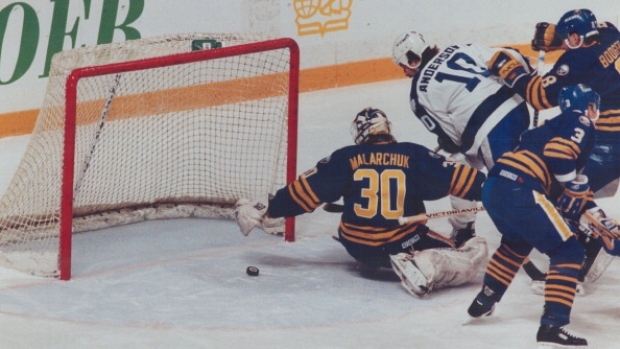Back on March 22nd, 1989, former Buffalo Sabres goaltender Clint Malarchuk suffered one of the most gruesome injuries in the history of sports. During a game between the Blues and Sabres in Buffalo, Steve Tuttle of the Blues and Uwe Krupp of the Sabres crashed hard into Malarchuk.
During the collision, Tuttle’s skate blade sliced open Malarchuck’s jugular vein in his neck, instantly shooting a stream of blood out onto the ice.
In an interview with the Player’s Tribune titled “Bleeding Out.,” Malarchuk opened up about another obstacle that almost took his life: his personal struggles with depression, anxiety, and OCD.
At the age of 47, Malarchuk’s mebattles finally caught up with him. On October 7th, 2008, after drinking 25 beers, Malarchuk grabbed a rifle shot himself in the chin. The following quotes are taken from the article below:
The following quotes were taken from the article:
“I never passed out or lost consciousness after I shot myself in the face. In fact, they had to knock me out to get me onto the helicopter for life-flight.”
I realize now, when I think back on doing that … just how sick I was. I was ill. I was very ill.
Once I accepted that the PTSD combined with my alcoholism was probably what led to everything else, I could finally process things and move forward. I could also, I realized, help lots and lots of people at the same time."
The goaltender, now 56, went into some of the terrifying details on the horrific night in Buffalo.
“Terry Gregson was reffing that night. I’ll never forget him skating over to me right after I went down. I saw his face go completely white, and then I just heard him screaming to anyone who could hear his voice.
Get a stretcher out here now!
Then a quick beat.
He’s gonna die!"
Malarchuk will be in Colorado on Thursday when the Avs host the Kings for Mental Health Awareness Night exactly 29 years after the skate incident. Given Malarchuck’s history in the NHL and everything he’s been through, the goaltender is now turning his efforts to helping those that struggles with their own mental health issues.
“These days I speak to groups all over the country about mental health issues. I tell them that there is no shame in needing help, or in asking for that help in whatever way you are able. I get emails and Facebook messages every day from people who have heard me speak, or have read my book, and when I’m speaking about these issues or responding to those messages, I feel like I’m on top of the world. Just knowing that I might be able to help someone in their journey through life is enough to make me so happy.”
If you have the time make sure you read the full article.
(h/t Player's Tribune)




